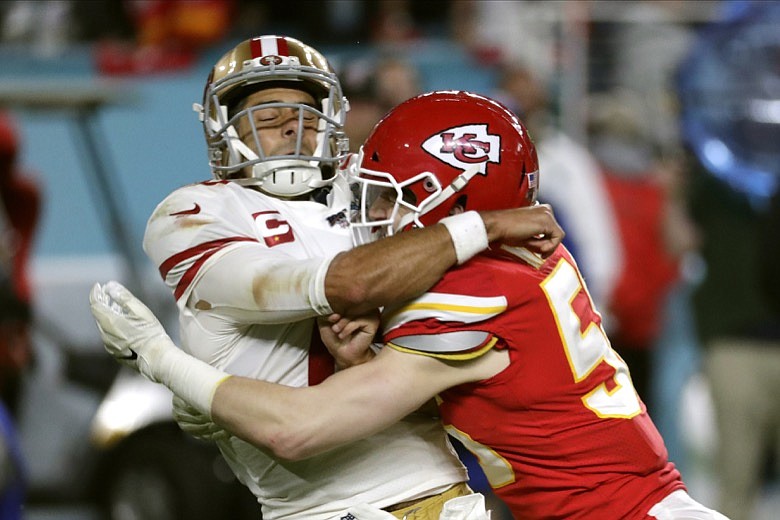The biggest event in the U.S. came and went Sunday.
There were more than 1.4 billion chicken wings sold, and that figure means if you and I sat down and ate three wings a minute, it would take us roughly 450 years to eat them all.
To be sure, Super Bowl Sunday is a day of excess. And also a day for profits. Advertisers spent close to $500 million on commercials. Calorie consumption is second only to Thanksgiving, and the Super Bowl is gaining. Did you even try to get into a Food City over the weekend?
But millions in revenue stopped short of reaching our state coffers this weekend. Of the almost $7 billion bet on Kansas City's 31-20 Super Bowl win over San Francisco, none went to the state of Tennessee.
Why, you may wonder, considering that our state legislators made sports gambling legal last year? Good question.
The answer is less than good for us, and it's also much less than clear moving forward.
Quick recap: Tennessee legislators agree to legalize sports wagering, and the law went into effect July 1 of last year. The state lottery commission is running the show and the show, simply put, has been at a standstill.
There are a slew of reasons why.
We know that sports betting now is legal in Tennessee but not available. We know that Republican Gov. Bill Lee is not a fan of sports betting. We know the rules proposed by the state for the third-party operators are the most stringent and difficult in terms of payouts among the states that have legalized sports gambling.
And we are pretty sure the inactivity has cost Tennessee and its citizens enough money to make Dolly Parton blush.
"The Oxford study put the annual handle (total money wagered) for Tennessee at $4.5 billion," legalized sports betting pooh bah Daniel Wallach said Monday, referencing an economic study commissioned by Oxford Economics, a global consulting firm. "Sports betting is expected to generate more than $50 million in annual tax revenue for the state."
What? In times of economic distress for many counties, cities and municipalities, we have our state slow-walking something that could generate $50 million? Egad.
If the mother of invention is necessity, then the father of frustration is inactivity, people. Someone should be fired for this. Right?
But wait. Wallach also shared that this is not a quick process, especially for a state like ours that does not have a regulated gambling industry or even a state gaming board beyond a lottery commission.
"This is not an overnight process, a next-week process or even a next-month process," Wallach said. Most states that have passed sports betting laws have taken several months to implement sports betting. This is largely because the rule-making and licensing process takes some time.
"But Tennessee's delay has been longer than most. It is now going on eight months since the state's sports betting law went into effect.
"This has been a missed opportunity for Tennessee, particularly in light of the Titans' deep playoff run and the significant betting surrounding the Super Bowl, which is the most wagered-upon sporting event in North America."
Wallach is no novice when it comes to this topic. He started Wallach Legal LLC, the nation's first law firm dedicated to the legalization of sport wagering in states across the country. He is a co-founding director of the University of New Hampshire School of Law's Sports Wagering and Integrity Program, the nation's first law school certificate program dedicated to the study of sports wagering and integrity. He also covers sports gambling and legal issues for The Athletic.
This is not about the morality of the sports betting bill; that was for last spring, even for our governor, who did not veto the law but also did not sign it. This should be about making sure our leaders are working with an ethic to serve the will of their constituents and the benefit of the taxpayers as well as avoiding the interests of certain groups against legalized betting.
TFP reporter Andy Sher's story over the weekend suggested progress is being made, considering there is an important meeting of the powers that be in a couple of weeks.
Supporters have their fingers crossed that all will be set for betting to be available for March Madness, but admit summer is more likely.
As we look toward these important meetings two weeks from today, let's review two issues.
We'll start with the 85 percent holding requirement for state-partnered gaming groups. Simply put, that means if the current requirement stands, when Tennesseans bet $100, they could win no more than $85 over the course of a year.
That unprecedented requirement, Wallach said, and conventional wisdom confirms, would drive in-state bettors to seek better odds and payouts from gambling operators in other states, or even worse, from offshore websites, which operate illegally.
"It's not a great business model for customers or even for operators," Wallach said of the 85-percent hold requirement.
But any idea that the $750,000 license fee or the exorbitant 85-percent hold would cause every operator to steer clear of Tennessee is "unrealistic," Wallach said. He did add, however, that "if the 85-percent requirement remains intact, the Tennessee lottery is likely to receive significantly fewer license applications, which, in turn, would give consumers less choice."
Secondly, beyond the business model, the 85-percent hold also may be against the law, according to Wallach.
"The proposed regulation capping aggregate annual payouts at 85 percent appears to exceed the limited grant of authority delegated by the Legislature to promulgate rules on the 'manner' in which payouts are made to bettors," Wallach wrote.
So, two weeks from today, when the Tennessee Lottery folks and the Sports Wagering Board sit down and try to do the will of the majority of us, they must address the following:
* The 85-percent hold must be seriously reviewed and almost assuredly be moved to more bettor-friendly rates;
* There has to be a stated and generally-agreed-upon timeline for implementation, because while the state's highest office holder may not want this, the majority of the state does.
Beyond that, the future of sports betting around these parts looks to be a coin flip.
Contact Jay Greeson at jgreeson@timesfreepress.com.

